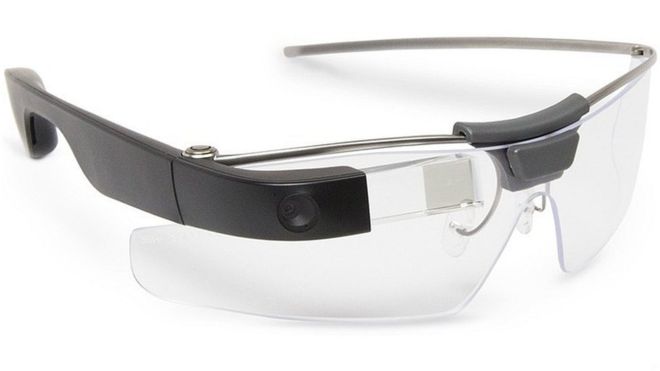Google Glass smart eyewear returns
Thu Jul 20, 2017
The company said Glass Enterprise Edition had improved battery life and felt more comfortable during long-term wear than before.
However, it still resembles the original model, with a small see-through display and built-in camera.
It will face competition from Microsoft's HoloLens among others.
Many had assumed the project had been cancelled after the executive in charge, Tony Fadell, resigned last year.
However, parent company Alphabet's X division continued to develop the technology and has now revealed its efforts in a post on the news site Medium.
'Workers in many fields, like manufacturing, logistics, field services, and healthcare find it useful to consult a wearable device for information and other resources while their hands are busy,' wrote project lead Jay Kothari.
'That's why we've spent the last two years working closely with a network of more than 30 expert partners to build customised software and business solutions for Glass for people in these fields.'
Mr Koathri revealed that logistics workers at the delivery company DHL, engineers at General Electric and medics at Dignity Health had been among those secretly using the eyewear over recent months.
Wired magazine added that those involved had had to promise not to reveal the existence of Glass Enterprise Edition and pose with the old version in any photos showing them using the eyewear at work.
Improvements over the earlier Explorer Edition include:
a more powerful processor
an eight megapixel camera, up from 5MP before
the camera button now doubles as a way to detach the electronics from their frame, making it easier to attach them to prescription and safety glasses
the battery life lasts for about eight hours of typical use excluding video streaming, up from about five hours before
more robust wi-fi connectivity
Google sold the original prototype edition for £1,000.
This time, the product will be sold via a range of specialised software companies, which are bundling it with their respective services.
Germany-based Ubimax - which makes software for logistics and manufacturing workers - told the BBC it would charge about 1,500 euros ($1,735; £1,335) per unit on top of rolling fees for its own solutions.
'It makes perfect sense to target businesses,' said Chris Green from the technology consultancy Lewis.
'While the original iteration of Google Glass had questionable consumer applications, we are already seeing that there is huge potential for augmented reality particularly in things like manufacturing.
'For example, a floor worker can get a single view of all the sensor data across a production line, from data about output and wear and tear of components, to where the bottlenecks are, all in a way they wouldn't be able to do just by wandering the line normally.'
But in the period Google left the market, other companies, including Vuzix, Meta and Epson, have developed their own augmented reality eyewear targeted at businesses.
And Microsoft began selling a 'developer edition' of its more advanced - and more expensive - HoloLens augmented reality headset last year.
It benefits from superimposing graphics over both eyes and can run more complex apps, since it is powered by a Windows 10 PC rather than a smartphone.
However, at present, HoloLens offers only two to three hours of active use.
SOURCE: BBC NEWS


Write Your Comments